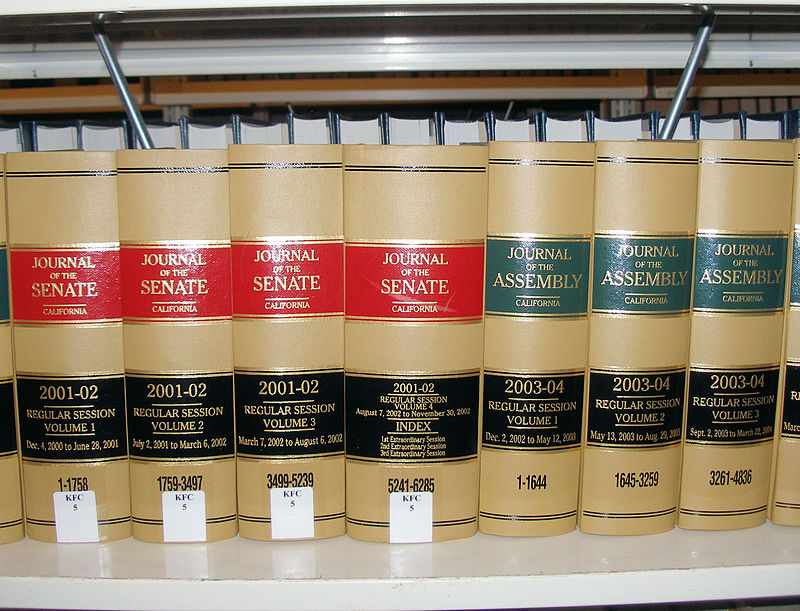
California Senate Chambers. (Photo: Kevin Sanders for California Globe)
Determining Whether Amendments Are Germane
The determination of germaneness is decided by the Presiding Officer of either the State Assembly or State Senate
By Chris Micheli, January 8, 2020 6:01 am
In the California Legislature, as with several other legislative bodies around the country, there is an initial question regarding whether amendments to existing bills must be “germane” to the subject matter of the existing bill. As described in legislative glossaries, “germane” refers to whether a proposed amendment is relevant to the subject matter in the bill.
In California, the Office of the Legislative Counsel may opine on germaneness, but the determination of germaneness is decided by the Presiding Officer of either the State Assembly or State Senate, subject to an appeal by the membership. In other words, the ultimate determination of whether amendments are germane to an existing bill rests with the legislators in either house. Each house of the Legislature has rules related to determining whether amendments are germane.
ASSEMBLY
There are several rules in the State Assembly regarding the issue of “germane” bills regarding their subject matter. Pursuant to Assembly Rule 47(d), the Committee on Budget may introduce a bill that is germane to any subject within the jurisdiction of the committee in the same manner as any Assembly Member. Any other standing committee may introduce a total of five bills in each year of a biennial session that are germane to any subject within the proper consideration of that committee.
Under Assembly Rule 92, titled Amendment to Be Germane, provides that an amendment to any bill, other than a bill stating legislative intent to make necessary statutory changes to implement the Budget Bill, whether reported by a committee or offered by an Assembly Member, is not in order when the amendment relates to a different subject than, is intended to accomplish a different purpose than, or requires a title essentially different than, the original bill.
Furthermore, Rule 92 states that a motion or proposition on a subject different from that under consideration may not be admitted as an amendment. An amendment is not in order that changes the original number of any bill.
SENATE
Under Senate Rule 23(a), similar to its Assembly counterpart, a standing committee may introduce a bill that is germane to any subject within the proper consideration of the committee in the same manner as any Senator. Under Subdivision (b), a committee may amend into a bill related provisions that are germane to the subject and embraced within the title and, with the consent of the author, may constitute that bill a committee bill.
Under Subdivision (e), there is a distinction drawn to amendments to rewrite a bill. The first inquiry is whether the amendment is germane to the previous version of the bill, but adds a new subject to the bill that is different from, but related to, the contents of the bill. Subdivision (f) acknowledges new bills when an amendment creates a new bill if the amendment changes the subject of the bill to a new or different subject.
Senate Rule 38.5 requires every amendment proposed to be germane. In order to be germane, an amendment must relate to the same subject as the original bill, resolution, or other question under consideration. A point of order may be raised that the proposed amendment or an amendment now in the bill, resolution, or other question under consideration is not germane, so long as the question is within control of the body.
In that case, Rule 38.5 provides the President pro Tempore must decide whether the point of order is well taken. In the absence of the President pro Tempore, the Vice Chair of the Committee on Rules decides whether the point of order is well taken. If, in the opinion of the President pro Tempore or the Vice Chair of the Committee on Rules, the point of order is well taken, the question of germaneness is referred to the Committee on Rules for determination.
Thereafter, the Committee on Rules must make its determination by the following legislative day. If the point of order is raised and referral is made on the last legislative day preceding a joint recess, the Committee on Rules makes its determination before adjourning for the recess. The matter remains on file until the determination is made.
Finally, if, upon consideration of the matter, the Committee on Rules determines that the amendment is not germane, then the bill, resolution, or other question is stricken from the Daily File and may not be acted upon during the remainder of the session, provided that the author of a bill, resolution, or other question must be given the opportunity to amend the bill, resolution, or other question to delete the portions that are not germane. If that occurs, then the bill, resolution, or other question may continue to be acted upon. If the Committee on Rules determines that the amendment is germane, the bill, resolution, or other question may be acted upon by the house.
- Seaport Infrastructure Financing in California - August 6, 2025
- Exclusive Rights of Pilotage - August 5, 2025
- Civil Action Mediation in California - August 4, 2025







